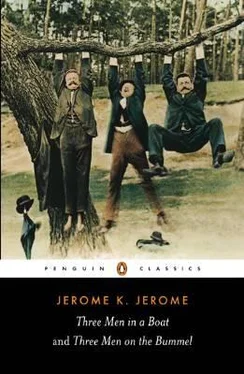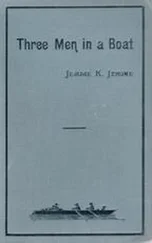Jerome Jerome - Three Men on the Bummel
Здесь есть возможность читать онлайн «Jerome Jerome - Three Men on the Bummel» весь текст электронной книги совершенно бесплатно (целиком полную версию без сокращений). В некоторых случаях можно слушать аудио, скачать через торрент в формате fb2 и присутствует краткое содержание. Жанр: Юмористическая проза, на английском языке. Описание произведения, (предисловие) а так же отзывы посетителей доступны на портале библиотеки ЛибКат.
- Название:Three Men on the Bummel
- Автор:
- Жанр:
- Год:неизвестен
- ISBN:нет данных
- Рейтинг книги:4 / 5. Голосов: 1
-
Избранное:Добавить в избранное
- Отзывы:
-
Ваша оценка:
- 80
- 1
- 2
- 3
- 4
- 5
Three Men on the Bummel: краткое содержание, описание и аннотация
Предлагаем к чтению аннотацию, описание, краткое содержание или предисловие (зависит от того, что написал сам автор книги «Three Men on the Bummel»). Если вы не нашли необходимую информацию о книге — напишите в комментариях, мы постараемся отыскать её.
Three Men on the Bummel — читать онлайн бесплатно полную книгу (весь текст) целиком
Ниже представлен текст книги, разбитый по страницам. Система сохранения места последней прочитанной страницы, позволяет с удобством читать онлайн бесплатно книгу «Three Men on the Bummel», без необходимости каждый раз заново искать на чём Вы остановились. Поставьте закладку, и сможете в любой момент перейти на страницу, на которой закончили чтение.
Интервал:
Закладка:
The Professor felt he had discovered the poet of the class.
"Because the sun could not get into it, or, better, because the sunbeams could not penetrate. And why could not the sunbeams penetrate there?"
"Please, sir, because the leaves were too thick."
"Very well," said the Professor. "The girl lived in a dark and gloomy wood, through the leafy canopy of which the sunbeams were unable to pierce. Now, what grew in this wood?" He pointed to the fourth boy.
"Please, sir, trees, sir."
"And what else?"
"Toadstools, sir." This after a pause.
The Professor was not quite sure about the toadstools, but on referring to the text he found that the boy was right; toadstools had been mentioned.
"Quite right," admitted the Professor, "toadstools grew there. And what else? What do you find underneath trees in a wood?"
"Please, sir, earth, sir."
"No; no; what grows in a wood besides trees?"
"Oh, please, sir, bushes, sir."
"Bushes; very good. Now we are getting on. In this wood there were trees and bushes. And what else?"
He pointed to a small boy near the bottom, who having decided that the wood was too far off to be of any annoyance to him, individually, was occupying his leisure playing noughts and crosses against himself. Vexed and bewildered, but feeling it necessary to add something to the inventory, he hazarded blackberries. This was a mistake; the poet had not mentioned blackberries.
"Of course, Klobstock would think of something to eat," commented the Professor, who prided himself on his ready wit. This raised a laugh against Klobstock, and pleased the Professor.
"You," continued he, pointing to a boy in the middle; "what else was there in this wood besides trees and bushes?"
"Please, sir, there was a torrent there."
"Quite right; and what did the torrent do?"
"Please, sir, it gurgled."
"No; no. Streams gurgle, torrents-?"
"Roar, sir."
"It roared. And what made it roar?"
This was a poser. One boy-he was not our prize intellect, I admit-suggested the girl. To help us the Professor put his question in another form:
"When did it roar?"
Our third boy, again coming to the rescue, explained that it roared when it fell down among the rocks. I think some of us had a vague idea that it must have been a cowardly torrent to make such a noise about a little thing like this; a pluckier torrent, we felt, would have got up and gone on, saying nothing about it. A torrent that roared every time it fell upon a rock we deemed a poor spirited torrent; but the Professor seemed quite content with it.
"And what lived in this wood beside the girl?" was the next question.
"Please, sir, birds, sir."
"Yes, birds lived in this wood. What else?"
Birds seemed to have exhausted our ideas.
"Come," said the Professor, "what are those animals with tails, that run up trees?"
We thought for a while, then one of us suggested cats.
This was an error; the poet had said nothing about cats; squirrels was what the Professor was trying to get.
I do not recall much more about this wood in detail. I only recollect that the sky was introduced into it. In places where there occurred an opening among the trees you could by looking up see the sky above you; very often there were clouds in this sky, and occasionally, if I remember rightly, the girl got wet.
I have dwelt upon this incident, because it seems to me suggestive of the whole question of scenery in literature. I could not at the time, I cannot now, understand why the top boy's summary was not sufficient. With all due deference to the poet, whoever he may have been, one cannot but acknowledge that his wood was, and could not be otherwise than, "the usual sort of a wood."
I could describe the Black Forest to you at great length. I could translate to you Hebel, the poet of the Black Forest. I could write pages concerning its rocky gorges and its smiling valleys, its pine-clad slopes, its rock-crowned summits, its foaming rivulets (where the tidy German has not condemned them to flow respectably through wooden troughs or drainpipes), its white villages, its lonely farmsteads.
But I am haunted by the suspicion you might skip all this. Were you sufficiently conscientious-or weak-minded enough-not to do so, I should, all said and done, succeed in conveying to you only an impression much better summed up in the simple words of the unpretentious guide book:
"A picturesque, mountainous district, bounded on the south and the west by the plain of the Rhine, towards which its spurs descend precipitately. Its geological formation consists chiefly of variegated sandstone and granite; its lower heights being covered with extensive pine forests. It is well watered with numerous streams, while its populous valleys are fertile and well cultivated. The inns are good; but the local wines should be partaken of by the stranger with discretion."
Chapter VI
Why we went to Hanover-Something they do better abroad-The art of polite foreign conversation, as taught in English schools-A true history, now told for the first time-The French joke, as provided for the amusement of British youth-Fatherly instincts of Harris— The road-waterer, considered as an artist-Patriotism of George— What Harris ought to have done-What he did-We save Harris's life— —A sleepless city-The cab-horse as a critic.
We arrived in Hamburg on Friday after a smooth and uneventful voyage; and from Hamburg we travelled to Berlin by way of Hanover. It is not the most direct route. I can only account for our visit to Hanover as the nigger accounted to the magistrate for his appearance in the Deacon's poultry-yard.
"Well?"
"Yes, sar, what the constable sez is quite true, sar; I was dar, sar."
"Oh, so you admit it? And what were you doing with a sack, pray, in Deacon Abraham's poultry-yard at twelve o'clock at night?"
"I'se gwine ter tell yer, sar; yes, sar. I'd been to Massa Jordan's wid a sack of melons. Yes, sar; an' Massa Jordan he wuz very 'greeable, an' axed me for ter come in."
"Yes, sar, very 'greeable man is Massa Jordan. An' dar we sat a talking an' a talking-"
"Very likely. What we want to know is what you were doing in the Deacon's poultry-yard?"
"Yes, sar, dat's what I'se cumming to. It wuz ver' late 'fore I left Massa Jordan's, an' den I sez ter mysel', sez I, now yer jest step out with yer best leg foremost, Ulysses, case yer gets into trouble wid de ole woman. Ver' talkative woman she is, sar, very— "
"Yes, never mind her; there are other people very talkative in this town besides your wife. Deacon Abraham's house is half a mile out of your way home from Mr. Jordan's. How did you get there?"
"Dat's what I'm a-gwine ter explain, sar."
"I am glad of that. And how do you propose to do it?"
"Well, I'se thinkin', sar, I must ha' digressed."
I take it we digressed a little.
At first, from some reason or other, Hanover strikes you as an uninteresting town, but it grows upon you. It is in reality two towns; a place of broad, modern, handsome streets and tasteful gardens; side by side with a sixteenth-century town, where old timbered houses overhang the narrow lanes; where through low archways one catches glimpses of galleried courtyards, once often thronged, no doubt, with troops of horse, or blocked with lumbering coach and six, waiting its rich merchant owner, and his fat placid Frau, but where now children and chickens scuttle at their will; while over the carved balconies hang dingy clothes a-drying.
A singularly English atmosphere hovers over Hanover, especially on Sundays, when its shuttered shops and clanging bells give to it the suggestion of a sunnier London. Nor was this British Sunday atmosphere apparent only to myself, else I might have attributed it to imagination; even George felt it. Harris and I, returning from a short stroll with our cigars after lunch on the Sunday afternoon, found him peacefully slumbering in the smoke-room's easiest chair.
Читать дальшеИнтервал:
Закладка:
Похожие книги на «Three Men on the Bummel»
Представляем Вашему вниманию похожие книги на «Three Men on the Bummel» списком для выбора. Мы отобрали схожую по названию и смыслу литературу в надежде предоставить читателям больше вариантов отыскать новые, интересные, ещё непрочитанные произведения.
Обсуждение, отзывы о книге «Three Men on the Bummel» и просто собственные мнения читателей. Оставьте ваши комментарии, напишите, что Вы думаете о произведении, его смысле или главных героях. Укажите что конкретно понравилось, а что нет, и почему Вы так считаете.










